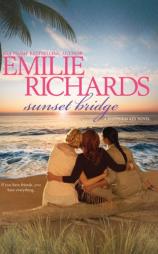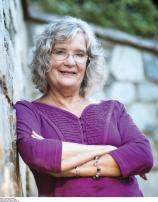Interview: July 1, 2011
Emilie Richards is the author of over 60 novels, which is quite a staggering feat. Her Happiness Key series began in 2009 and concludes with SUNSET BRIDGE. Now, more than ever, the five female friends of Happiness Key, Florida, will discover just how much they need one another. Bookreporter.com's Sarah Rachel Egelman spoke with Richards about her characters, and the joy she felt when creating and developing them. She also reveals her writing process, which has recently changed gears, and how relationships, friendships and motherhood function in this book and in others.
Bookreporter.com: What was the inspiration or original idea for the friends of Happiness Key? And what was the particular starting point for your new novel, SUNSET BRIDGE?
Emilie Richards: I've written about all kinds of relationships women experience, and, of course, there have always been friendships, but in all the books I've written, I've never made friendship the major focus of my story. I decided it was time to change that since friends are so important in my own life. SUNSET BRIDGE, which takes place in time almost immediately after FORTUNATE HARBOR, was the final novel of a series that began as one book and morphed into three. I wanted to tie up the loose ends in this last one without breaking any of the bonds I'd already established. Three was just right.
BRC: There are a number of important themes in SUNSET BRIDGE, including motherhood. Each of the women, except for Maggie, is a mother or caring for children as a mother. Did you set out to explore this topic, or did it surface as you were writing? Which character's story of motherhood or caregiving came first?
ER: Caring for children is an important part of many women's lives. I wanted to explore all the facets. The series has a grandmother caring for an "orphaned" granddaughter. A mother of two adult children, with the boundary issues that ensue when one comes back to the nest. A young woman who has always expected to give birth to her own children and finds there are other ways to make a family. Another young woman who's never given children much thought and suddenly finds that's no longer an option.
The story of Alice, who's caring for her granddaughter Olivia, was featured in the first book, and as all the women in the community stepped up to help protect and nurture them, friendships were enriched by it. I loved that theme and wanted it to continue.
BRC: All five main characters --- Wanda, Maggie, Tracy, Jayna and Alice --- also represent ideas about partnership; from the fear of commitment to the love in an arranged marriage, there are several types of relationships presented. Which relationship in the novel was the most fun to develop?
ER: Great question. I'd have to say Tracy's relationship with Marsh was the most fun because it takes three books to resolve it. Both are essentially clueless about how to express their feelings, as they are damaged from previous marriages. Tracy's growth as a person was great fun for me. While readers occasionally have problems with characters who are less than sympathetic at the beginning of a novel, authors adore them, because we get to work magic.
BRC: The residents of Happiness Key see a lot of action in this novel --- from murder and other crimes to hurricanes and parties with movie stars. Was it difficult to find a balance between the story of friends and the suspense and drama in SUNSET BRIDGE?
ER: HAPPINESS KEY was a quieter novel, which established the characters and relationships. FORTUNATE HARBOR ramped up the action because that groundwork had been laid. SUNSET BRIDGE, as the conclusion, took action to a new level because so much had been set up already, and because the relationships among the women were solid and supportive and could handle those events. I think it will be absolutely clear to my readers that these friendships will continue, because they've already remained strong through so many challenges.
BRC: Of the five main characters, which one had the most fun or most challenging story to write?
ER: Tracy's character, as I said before, was probably the most fun, but Janya's was the most challenging. From experience I know that putting myself in the shoes of someone from a different ethnicity or culture demands a great deal of sensitivity and care, but novelists need to write about people whose backgrounds are different from our own, or we'll bore our readers to death. Plus, trying to put ourselves in the shoes of someone from a different culture expands our own awareness of the world. My use of a Guatemalan heroine in another book eventually led me to Mayan villages where I heard firsthand the stories of massacres there. Had I not researched my character's past, I would not have had that transforming experience. And I have to add that we adopted our now-adult daughter from India when she was six, so I've always had an active interest in all things Indian.
BRC: You live in Virginia, but these books are set in Florida. Is this a region you are familiar with or particularly fond of?
ER: I grew up in St. Petersburg and only left Florida after graduating from Florida State. I still have family in the area, and I'm seriously considering returning to live there. So it seemed well past time to use the Gulf Coast in a novel.
BRC: When you started writing about Happiness Key, did you know --- or were you hoping --- it would turn into a series?
ER: No, but I'm delighted it did. These characters were hard to let go of.
BRC: You were trained as a family counselor. How do you think that affects your writing style, plot and character development, and the stories you tell?
ER: I always ask "why" when I'm developing characters and story. And I'm never satisfied with simple answers, just as I was never satisfied when I did counseling.
BRC: What is your writing process like? Do you always know how the stories will end, or are you often surprised?
ER: Had you asked that question two months ago, I'd have told you how I always do a detailed outline and rarely deviate. However, I'm working on a novel now that will not be outlined. I know how it's going to end, know most of the events and characters, but there have been breathtaking surprises. Moral to that story? No matter how many books you write, remain humble.
BRC: You are a prolific writer by any standard, with over 60 published novels. Do you keep notes for stories that have been brewing for a while that you have yet to write? And where do you draw the energy for such creative work?
ER: I keep notes and rarely look at them. I think if a story idea is really a keeper, it will stay with me. As for energy? It's a big, beautiful, heartbreaking world, and I try to keep my eyes open and my imagination on high alert.
BRC: When you are not writing, how do you enjoy spending time?
ER: I spend as much time as I can with my husband, my four children and their families. I also quilt, read, garden and cook.
BRC: What are some recent or all-time favorite books you've read?
ER: I always find that question impossible to answer. There are so many fabulous books and authors, and some of them are good friends. I would hate to miss one in a list.
BRC: And, finally, can you tell us anything about what you are working on now? Can we expect another book following the lives of the women of Happiness Key?
ER: The Happiness Key trilogy is finished, and it's hard to imagine another book in that series --- although stranger things have happened. Right now I'm working on a new series, Goddesses Anonymous, which will debut next August, although we're still struggling with a title for the first book. The series is also about friendships, although not in the same way, and it has a different feel. It seems to have a mind of its own, so stay tuned. Who knows what will happen?




